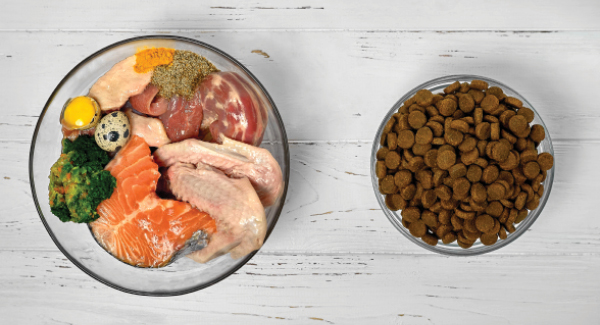Vertical Focus: Pet Supplies

Pets Get Their Paws on Table Food
With 89% of dog and cat owners saying it’s important for their pets to eat the highest-quality ingredients, a Chewy.com survey reports, dog and cat food manufacturers shift their products from pet food facilities to human food supply chains.
Two examples: The Honest Kitchen recently launched a 100% human-grade cat product line in which all ingredients are sourced from the human food supply chain, and is set to open a new facility in Kansas that produces human-grade pet food. And Australia-based ilume created a “smart bowl” and “smart collar” that analyze a dog’s activity and make diet recommendations.
Trends from the Chewy.com survey reveal:
- 52% of pet owners seek pet food that has strictly “clean” ingredients.
- 75% of millennial and Gen X pet parents are especially interested in grain-free, organic, and non-GMO food.
- 87% of pet owners say it’s important to check pet food labels, looking for keywords such as organic, high-quality nutrition, high protein, superfood, limited-ingredient, non-GMO, farm-fresh, and preservative-free.
- 84% of pet owners opt for pet foods made in the United States, with a growing trend toward domestically produced food.
- 82% are interested in geographic origins and physical production locations, such as factories or farms.
Insects Have Gone to the Dogs
Don’t bug out—finding insects in your dog’s food could be a good thing. High-end dog food startup Pure Simple True whips up dog treats made with sustainable insect protein.
The e-commerce-only brand uses Ÿnsect’s Molitor larvae in its human-grade Bernie’s Tender Medallion dog treats, Ÿnsect’s first insect-based product in the United States. The ingredient is high in protein and hypoallergenic.
Pure Simple True controls its own production and supply chain, operating Bernie’s Cookhouse and fulfillment center in Seattle. The company’s coastal location provides easy access to key seafood ingredients.
Ÿnsect’s vertical insect farm in France uses mealworms to create sustainable insect ingredients, which are fully traceable, antibiotic-free, and applicable for dry and wet pet food.
Indoor vertical farming allows the supplier to be fully carbon-negative. Insect protein requires 98% less land and 45% fewer resources than traditional livestock farming, making it a sustainable protein alternative, the company says.
Retailers Fetch On-Demand Delivery
Pet parents across the United States can now get their pets’ food and supplies delivered to their doorstep within one hour as independent and big-box pet retailers jump on on-demand delivery services.
Independent Pet Partners, parent company of Chuck & Don’s, Loyal Companion, Kriser’s, and the Natural Pawz pet chains, teamed up with DoorDash to offer same-day delivery. The stores now make deliveries in under an hour on average.
Dollar Tree now offers same-day delivery of its grocery items and pet products in as quick as one hour from 7,000 stores through its partnership with Instacart, creating more competition with pet retailers for budget-conscious shoppers.
PetSmart is also using DoorDash for on-demand delivery of its pet food, toys, and supplies from 1,500 stores through its app and website. PetSmart also uses the DoorDash Drive white-label fulfillment platform, meaning Dashers can deliver native orders from its website, app, and third-party platforms.
Petco, which started using DoorDash to offer same-day delivery in 2020, reports the partnership has given it an advantage over e-commerce-only pet retailers, because fulfilling orders directly from its physical stores costs less than shipping.
Pet Owners Beg for Subscriptions
BARK, maker of BarkBox dog toy subscription boxes, continues to benefit from growing dog ownership, increased spending on pets, and increased online sales, says CEO Manish Joneja. The company added 271,000 active subscriptions in Q2 of fiscal 2021, a 39% increase compared to last year. Here are some contributing factors:
E-commerce focus: A rising share of pet sales occurs online. In 2015, e-commerce represented 3% of total pet sales, rising to 25% in 2020 and 35% by 2024. BARK is investing in new talent to grow its online ecosystem. Anil Nair, previously at Amazon, is now its chief supply chain officer.
Add-to-box feature: The add-to-box feature allows consumers to add specific toys and treats to their existing subscription box each month. It’s a significant driver of revenue that enables BARK to recommend items tailored to each shopper. Last quarter, add-to-box drove $6 million of direct-to-consumer revenue, a 75% increase compared to the same period last year.
Food and health: The company has ramped up BARK Eats, a highly personalized subscription-based meal plan that can be added to existing subscriptions. It tailors each dog’s food by breed, size, age, and lifestyle. The company also launched BARK Bright, a dental treat and toothpaste kit and the first product in its health vertical sold as a subscription, a one-off add-to-box item, and in stores.
Facility upgrade: The company recently expanded its Ohio-based BARK Eats fulfillment center from 12,000 square feet to 100,000 square feet. This expansion, as well as packaging automation, increases its ability to ship to customers throughout the United States quickly and cost-effectively. The company also introduced operational efficiencies, such as automated packaging.
